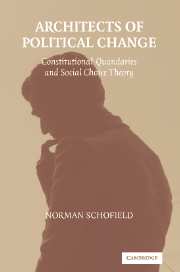Book contents
- Frontmatter
- Contents
- List of Tables and Figures
- Preface
- 1 Constitutional Quandaries and Social Choice
- 2 Power and Social Choice
- 3 Franklin and the War of Independence
- 4 Madison, Jefferson, and Condorcet
- 5 Lincoln and the Civil War
- 6 Johnson and the Critical Realignment of 1964
- 7 Keynes and the Atlantic Constitution
- 8 Preferences and Beliefs
- 9 Political Change
- Bibliography
- Index
- POLITICAL ECONOMY OF INSTITUTIONS AND DECISIONS
2 - Power and Social Choice
Published online by Cambridge University Press: 23 November 2009
- Frontmatter
- Contents
- List of Tables and Figures
- Preface
- 1 Constitutional Quandaries and Social Choice
- 2 Power and Social Choice
- 3 Franklin and the War of Independence
- 4 Madison, Jefferson, and Condorcet
- 5 Lincoln and the Civil War
- 6 Johnson and the Critical Realignment of 1964
- 7 Keynes and the Atlantic Constitution
- 8 Preferences and Beliefs
- 9 Political Change
- Bibliography
- Index
- POLITICAL ECONOMY OF INSTITUTIONS AND DECISIONS
Summary
INTRODUCTION
Mancur Olson's book, The Rise and Decline of Nations (1982a), used ideas from his earlier Logic of Collective Action (1965) to argue that entrenched interest groups in a polity could induce economic sclerosis, or slow growth. These ideas seemed relevant to the perceived relative decline of the United States and Britain during the 1970s. Five years later, Paul Kennedy's The Rise and Fall of the Great Powers (1987) proposed a more general “declinist” argument, that a great power such as the United States would engage in fiscal irrationality through increasing military expenditure, thus hastening its own decline. Neither of these two declinist arguments seem applicable to the situation of the new millennium. Olson's last book, Power and Prosperity, published posthumously in 2000, attempted a more general theoretical analysis of the necessary and sufficient causes of prosperity and growth. For Olson, only “securely democratic societies” could be conducive to long-lived individual rights to property and contract, but democracy itself need not be sufficient for the protection of rights. This chapter attempts to further develop Olson's logic on the connection between prosperity and liberty, by exploring insights derived from Riker's interpretation of U.S. Federalism (Riker, 1964), from the contribution of North and Weingast (1989) to neo-institutional economic theory, and from recent work on war and fiscal responsibility by Ferguson (1999, 2001, 2004) and Stasavage (2002, 2003).
The logic of economic growth is fairly well understood. In the absence of a well-defined system of property rights and the rule of law, economic growth, if it can be made to occur at all, will splutter or induce extreme inequalities that may rend the society apart.
- Type
- Chapter
- Information
- Architects of Political ChangeConstitutional Quandaries and Social Choice Theory, pp. 23 - 70Publisher: Cambridge University PressPrint publication year: 2006



